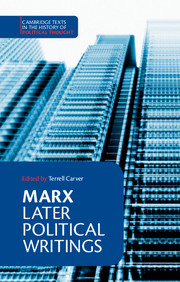Book contents
- Frontmatter
- Contents
- Acknowledgements
- Editor's introduction
- Chronology of Marx's Life and Career, 1848–1883
- Bibliography
- Editor's note on texts and translations
- Glossary of major historical figures
- Manifesto of the Communist Party (with Friedrich Engels)
- The Eighteenth Brumaire of Louis Bonaparte
- ‘Introduction’ to the Grundrisse
- ‘Preface’ to A Contribution to the Critique of Political Economy
- The Civil War in France
- Critique of the Gotha Programme
- ‘Notes’ on Adolph Wagner
- Index
- Cambridge Texts in the History of Political Thought
Manifesto of the Communist Party (with Friedrich Engels)
Published online by Cambridge University Press: 05 June 2012
- Frontmatter
- Contents
- Acknowledgements
- Editor's introduction
- Chronology of Marx's Life and Career, 1848–1883
- Bibliography
- Editor's note on texts and translations
- Glossary of major historical figures
- Manifesto of the Communist Party (with Friedrich Engels)
- The Eighteenth Brumaire of Louis Bonaparte
- ‘Introduction’ to the Grundrisse
- ‘Preface’ to A Contribution to the Critique of Political Economy
- The Civil War in France
- Critique of the Gotha Programme
- ‘Notes’ on Adolph Wagner
- Index
- Cambridge Texts in the History of Political Thought
Summary
A spectre stalks the land of Europe – the spectre of communism. The powers that be – Pope and Tsar, Metternich and Guizot, French Radicals and German police – are in holy alliance for a witchhunt.
Where is the opposition that has not been smeared as communistic by its enemies in government? Where is the opposition that has not retaliated by slandering more progressive groups and reactionary opponents alike with the stigma of communism?
Two things follow from this fact.
I. Communism is already recognised as a force by all the European powers.
II. It is high time for communists to lay before the world their perspectives, their goals, their principles, and to counterpose to the horror stories of communism a manifesto of the party itself.
For this purpose communists of various nationalities have gathered together in London and have drawn up the following manifesto, for publication in English, French, German, Italian, Flemish and Danish.
Bourgeois and proletarians
The history of all society up to now is the history of class struggles.
Freeman and slave, patrician and plebeian, lord and serf, guildmaster and journeyman, in short, oppressor and oppressed stood in continual conflict with one another, conducting an unbroken, now hidden, now open struggle, a struggle that finished each time with a revolutionary transformation of society as a whole, or with the common ruin of the contending classes.
- Type
- Chapter
- Information
- Marx: Later Political Writings , pp. 1 - 30Publisher: Cambridge University PressPrint publication year: 1996
- 34
- Cited by



